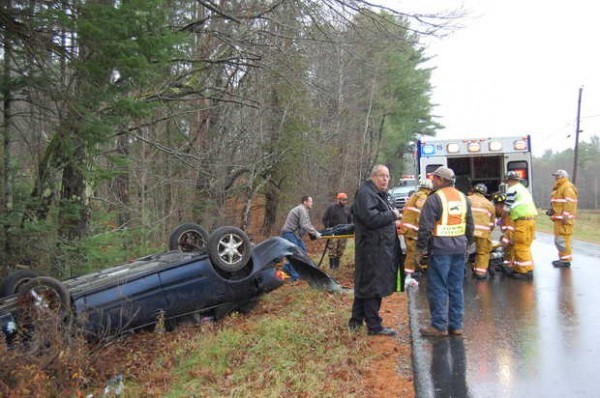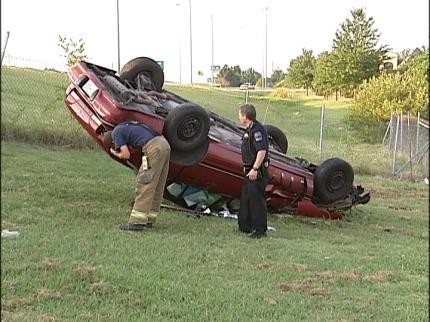How to Avoid Dangerous Vehicle Rollovers

How to Avoid Dangerous Vehicle Rollovers
A vehicle rollover is among the worst things that can happen to you on the road. Although rollovers occur in only about 3 percent of all serious crashes, they account for about 30 percent of all the people killed while riding in a passenger vehicle. At Service King Maryville, we fix many cars that have been damaged by rollovers, so that’s why we’re providing this useful information about how to avoid them or what to do when you’re in the middle of one.
The news is not all bad. When viewed in terms of rollover-fatalities per every million registered vehicles, all vehicle types have improved, and SUVs have improved the most. According to the IIHS, the rollover driver-death rate among newer (1 to 3 year old) passenger vehicles dropped from 27 in the year 2000 to 6 in 2012. The newest SUVs have lower rates than the newest cars.
Rollovers are obviously frightening, but it does not mean they have to be fatal or result in serious injury. If you’ve ever been in a rollover, you know how scary it is. Rollover-avoidance technologies, improved vehicle design, better safety systems, more stringent government regulations and the increased use of safety belts have cut down on the number of rollovers in the United States, but there is still much to do.

How Do Rollovers Happen?
Some people believe that because they own a small, compact car that is low to the ground, they will never encounter a rollover—but they’re badly mistaken. Any vehicle can roll over at any time. It is definitely true, however, that taller, narrower vehicles such as SUVs, pickups and vans are more likely to rollover, due to their higher center of gravity and the simple fact that they’re top heavy.
Side-to-side forces that develop when a vehicle comes around a curve shift the car’s center of gravity to one side. These lateral forces increase with speed and also with rapid changes of direction. For example, when a driver makes a sharp a turn one way and then overcorrects the other way that causes a pendulum effect, with larger and larger swings and an eventual loss of total control.
A single-vehicle rollover is rarely caused by a steering maneuver. Instead, the vehicle usually has to "trip" on something, such as when it swerves into a curb, pothole, or a soft roadside shoulder. The government has estimated that 95 percent of rollovers result from these trips. Some observers say that number is too high. If a vehicle leans in such a way that a tire's sidewall deforms and the wheel rim strikes the pavement and provokes a tip-up, then the government counts that as a tripped rollover.

How to Avoid a Rollover
- Good grip on your tires, but within reason. In every scenario, tire grip plays an ironic role in rollovers. Ideally, your vehicle should stay on course, gripping the road with all four wheels on the ground without exception. But too much tire grip can allow excessive sideway forces to build up until the vehicle flips over. Before that happens, you want the vehicle to gradually and predictably lose some lateral grip. Sliding is better than tipping over, but that too can put the vehicle at risk of hitting something during the slide, and then rolling anyway.
- Newer is better. Not all of us can buy a new car, but keep in mind that newer vehicles are safer. It makes sense to choose a vehicle with the most up-to-date safety systems, including electronic stability control and side-curtain air bags.
- Wear safety belts. Belts help keep you in the seat so you’re not tossed around in a rollover crash. About half of rollover fatalities occur when people are partly or completely ejected from the vehicle. In many accidents, roughly 75% of people ejected from a vehicle are killed.
- Check the tires. Make sure all the tires are in good shape and properly inflated to the pressure recommended by the vehicle manufacturer. Check the inflation pressure at least once a month. Replacement tires should be similar to the vehicle's original set.
- Watch the load. Overloading any vehicle decreases its stability and the worst thing to do is to place heavy loads on the roof. Try to stay well within the load ratings specified by the manufacturer. (They should be noted in your owner’s manual.) Try to place the heaviest cargo low on the floor and as far from the tailgate and as close to the center of the vehicle as possible.
- Monitor your speed. Maryville has speed limits posted as well as recommended speeds for corners and curves. It is important to pay attention to these recommended speeds. Speed makes a vehicle's tendencies to roll over more severe, and it also makes more demands on a driver's attention and skill. About 40 percent of fatal rollovers involve excessive speed, the government reports.
- Beware especially careful on country roads. Almost three-quarters of fatal rollovers occur in rural areas on roads where the speed limit is 55 mph or more. According to the National Highway Traffic Safety Administration, those roads tended to be undivided highways without barriers.
Stay firmly on the road and stay rollover-free by adhering to these tips, brought to you by Service King Maryville.












Social